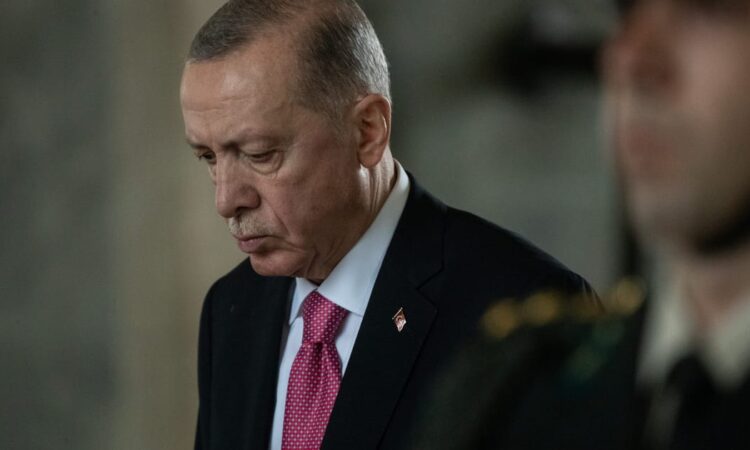
Press play to listen to this article
Voiced by artificial intelligence.
Since his re-election, Recep Tayyip Erdoğan has signaled a sharp change of economic course as he attempts to ward off an imminent balance of payments crisis in Turkey.
Late on Thursday, the country’s official gazette announced former Goldman Sachs banker Hafize Gaye Erkan as the nation’s first female central bank governor. That followed the eye-catching reappointment earlier in the week of Merrill Lynch veteran Mehmet Şimşek as finance minister.
Erdoğan’s dismissal of Simşek five years ago had been one of the triggers for Turkey’s last financial crisis.
The two face an enormous challenge: Inflation is at nearly 40 percent, and the central bank is fast running out of foreign reserves after using desperate and unsustainable methods to put off a currency crisis until after last month’s elections. It sold nearly two-thirds of its total gold holdings — over 80 tons — in April alone, according to the World Gold Council’s analysis.
“They’re in a very deep hole,” Paul McNamara, investment director at Swiss asset manager GAM, told POLITICO.
Both the current account and the budget are deeply in deficit, and international financial markets are effectively closed to Turkish borrowers. The lira, which was at less than four to the dollar when Simşek was fired five years ago, lurched to a new all-time low of 23.64 on Friday, and has lost over one-fifth of its value since the first round of the elections in May. GAM’s McNamara said he expects it to stabilize “closer to 30 than to 25.”
Foreign debts are falling due, and much of the central bank’s remaining reserves have already been pledged, in order to defend a promise Erdoğan made years ago to domestic savers ― that they would be able to convert their lira savings back into dollars at a specific rate.
Todd Schubert, head of fixed-income research at Bank of Singapore in Dubai, expects a sharp course correction in the coming weeks. Erkan, he notes, will likely have to raise interest rates to somewhere above 30 percent from 8.5 percent currently.
Erdoğan had pressured previous governors to cut rates well below the inflation level, insisting high interest rate payments were a driver of inflation. When Governor Naci Ağbal defied him and raised rates two years ago, he was fired within days.
This time is … different?
That kind of behavior raises doubts as to whether Erkan and Simşek will have the authority and the time to turn the ship around. In 20 years of ruling Turkey, the mercurial populist Erdoğan has rarely been able to stick to the kind of orthodox policies that traditionally bring stability, and McNamara expressed doubt that this time will be different.
“It’s going to be poisonously unpopular,” he warned, with a nod to what he called “the Ağbal precedent”.
“One has to presume that if [Şimşek] is willing to sign up, then he’ll be given the authority to enact the necessary reforms,” Schubert said. “We have cause for some optimism. But let’s see if it becomes reality… no-one can honestly say that they know the answer to that question right now.”
While some factors are going in the new team’s favor — tourism is buoyant and oil prices have fallen significantly — international markets are still likely to err on the side of caution, at least until they see official financial support for a credible reform course, from backers with deep pockets.
In the past, that would have meant a bailout from the International Monetary Fund, complete with radical spending cuts and structural reforms. But the stigma associated with submission to conditions dictated in Washington, and the availability of other deep-pocketed backers such as Saudi Arabia and Qatar – both of whom have a vested interest in keeping the region’s biggest military power sweet — make that route unlikely, analysts argue.
There may also be residual doubts over the ability of Erkan, personally, to deliver. While Şimşek’s reputation emerged unscathed from his stint as finance minister, Erkan’s glittering academic credentials and experience with Goldman are tarnished somewhat by a seven-year association with First Republic Bank, which culminated in a stint as co-chief executive.
FRB collapsed spectacularly less than 18 months after Erkan left it, as the Federal Reserve’s policy tightening exposed gross inadequacies in its management of interest rate risk. Erkan left in 2021 at a time when U.S. inflation was starting to roar, but before the Fed started raising rates. At the time of publication, she hadn’t responded to a request for comment.
“Her résumé makes it clear she’s very smart,” said Schubert, pointing to degrees from both Princeton and Harvard Business School. “But it takes more than being smart. As central bank head, you’ve got to walk that political tightrope.”






